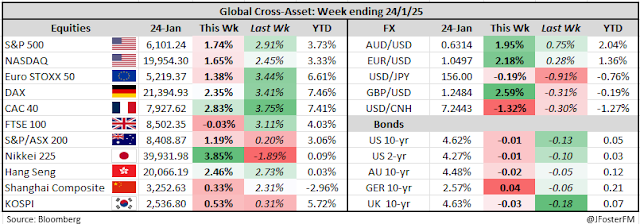Cross-asset volatility picked up as markets were dealt range of crosscurrents this week; elevated US tech valuations were called into question; President Trump vowed to impose tariffs on China, Canada and Mexico from February 1; while central bank policy divergence continued - the Fed hitting the pause button, but the BoC, Riksbank and ECB (discussed later) all cut by 25bps. Meanwhile, in Australia, an encouraging Q4 inflation report should allow the RBA to cut in February.
A well-telegraphed pause in the Fed's cutting cycle saw rates left in the 4.25-4.5% range. With minimal changes in the decision statement and in the messaging from Chair Powell at the post-meeting press conference, pricing for around 50bps of further easing was maintained. The broad assessment of the Fed is that with 100bps of easing delivered since last September, rates are now well calibrated given the prevailing conditions and the policy uncertainty around the Trump administration.
Although GDP figures for Q4 surprised to the downside of estimates at 0.6% quarter-on-quarter (2.5%Y/Y), US growth remains 'solid' in the view of the Fed while the unemployment rate has 'stabilised at a low level'. Inflation was characterised as still 'somewhat elevated' - its preferred core PCE deflator gauge came in at an unchanged 2.8%Y/Y pace in December - though the Fed remains confident that a return to the 2% target is on the horizon. A less dovish Fed through 2025 has kept US rates elevated and the dollar supported following their moves higher coming out of President Trump's election victory.
The ECB continues to cut interest rates, announcing a further 25bps reduction across its policy structure. This lowered the key depo rate to 2.75%, falling since the middle of last year from cycle tights of 4%. Key assessments from the Governing Council at the previous meeting remained unchanged this week: disinflation is 'well on track' and risks to growth 'tilted to the downside' - not least due to impending tariffs that President Trump has said will be forthcoming.
These dynamics are set to keep the ECB in easing mode through 2025. Markets are priced for rates to fall to 2% by year-end, implying an additional 75bps of cuts. That is one of the factors that has weakened the EUR to late 2022 lows just above parity to the USD. Should the downside risks to growth in the euro area materialise, the ECB may well cut beyond a neutral setting for rates into more expansionary levels. At the post-meeting press conference, ECB President Lagarde repeated familiar lines of data dependency and policy not being on a pre-set course. But some nuance was introduced with Lagarde telling markets that the ECB would next week publish new estimates of neutral policy settings.
Continued disinflationary progress reported in Australia's pivotal Q4 CPI release has an RBA rate cut in February priced as a done deal, with a total of around 100bps of cuts now priced into the curve. Key outturns for headline CPI at 0.2%q/q and 2.4%Y/Y (from 2.8%) and core or trimmed mean CPI at 0.5%q/q - slowest clip in 2½ years - and 3.2%Y/Y (from 3.5%) all surprised to the downside of market expectations, and, more importantly, printed below the RBA's forecasts (2.6%Y/Y headline and 3.4%Y/Y core). My detailed report covers the release in full here, but the main takeaway is that the disinflationary process is showing signs of broadening out beyond the effects of cost-of-living subsidies. The dual mandate of the RBA has made preserving the strong labour market a priority for the Board. With inflation now in around the 2-3% target band, a February cut looks straightforward.





































